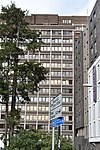Rose Bruford College
1950 establishments in EnglandBuildings and structures in SidcupDrama schools in LondonEducational institutions established in 1950Educational institutions in the London Borough of Bexley ... and 3 more
Higher education colleges in LondonRose Bruford CollegeUse British English from December 2013

Rose Bruford College (formerly Rose Bruford College of Theatre & Performance) is a drama school in the south London suburb of Sidcup. The college has degree programmes in acting, actor musicianship, directing, theatre arts and various disciplines of stagecraft.Its undergraduate and postgraduate qualifications and programmes were validated by the University of Manchester, until it received taught degree awarding powers in 2017. It is a member of the Federation of Drama Schools.
Excerpt from the Wikipedia article Rose Bruford College (License: CC BY-SA 3.0, Authors, Images).Rose Bruford College
Burnt Oak Lane, London Blackfen
Geographical coordinates (GPS) Address External links Nearby Places Show on map
Geographical coordinates (GPS)
| Latitude | Longitude |
|---|---|
| N 51.438888888889 ° | E 0.10666666666667 ° |
Address
Rose Bruford College
Burnt Oak Lane
DA15 9DF London, Blackfen
England, United Kingdom
Open on Google Maps






